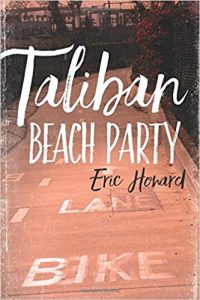
by Eric Howard
Paperback: 108 pages
Publisher: Turtle Point Press (April 11, 2017)
ISBN-10: 1933527897
$16
Errant love gods rule the hood in this iconic collection of poems; rooted in the urban dreamscapes of Los Angeles. Eric Howard writes like William Carlos Williams, reincarnated as Johnny Depp, doing a gig as a tour guide for Dante. The work is erudite, and elegant but sexy and wild too, imbued with that all too rare quality in contemporary poetry, of being really exciting to read.
Beginning with an imprecation to Venus, on a bike ride along the LA River, we quickly realize this journey is taking us to a city we have never quite seen before: “by poplars and electric towers, wings/ of birds rising by ankle and helmet,/ your red-faced slave, along the green water” (from “Riding to the L.A River Bike Path”).
Traveling by bicycle (which reads like rebellion to LA car culture) moves us through the open air, vulnerable, exposed, with few directions we can’t go. These poems unfold in the same way, opening up our assumptions about what is around us. In these lines from “El Camino,” rarely glimpsed LA birds feel like our own lives as they flit among urban ambitions and anxieties: “Over the culvert the crow,/ glides by letting things be like this, between/ the freeway and the killdeer/ my tires leaving no mark on the concrete.” How can we live here, these poems seem to ask, how can we live like this?
Contrasting images of the natural world with the post-modern metropolis, recur throughout the collection. It’s a powerful mix. Here’s a view from “At the Top of Mount Hollywood Drive“: “The freeway’s out of hearing here. Just wind/ in the pines where I stop after riding up, the city in silence below. Hikers/ walk by and ask, “Is the Hollywood Sign/ that way?” Pointing down the road. I say yes, / having learned to lie, because the truth takes/ too long to say-…”
By shifting images or rhythm in the middle of poems, Howard makes us feel the disjunctive nature of urban experience. Again in the poem “El Camino,” the telling starts off in one direction but veers off. Concrete images of his neighbor Raul’s trailer home and his El Camino “he’s got the engine rumbling right” move “through the gap in the chain link” to the other side, where we find Antonio Machado pushing his tubercular bride in a wheel chair, and a homeless Walt Whitman loafing in a cactus park. This “gap” reads as both a real fence in the neighborhood, and a metaphorical hole in the fences of perception. On one side Raul’s El Camino, on the other side, images of the Spanish social realist Machado, a brilliant mix. Howard’s work is rich with clever quips on the poetry canon. In “The Great Rumble,” he updates William Carlos Williams’ “The Great Figure“: “Among the drought dirty/ work trucks/ we look up to see the 5’s /exhaust-black steel beams/ on great concrete…”
In “Saint John” we hear echoes of Ginsburg’s “Howl”: “On a dark night, happy, burning/ with want, I went unnoticed/from my quiet house in shadow. …”
One of the most satisfying aspects of this book is the way the poems build on themselves to construct a living city peopled with memorable characters like “the drummer girl.” She haunts these poems, where we feel the intimate surprises of lived life, like the note taped to the fridge in one poem, “So sorry, really.” There is an after effect of narrative story telling here. Between the fleeting pleasures of love, and the office we come to know our narrator well, and what parties he goes to. The title poem Taliban Beach Party shares this intimate tone, drawing us into a gathering that includes:
Three frugging ulalating Burkaettes
Backed up befezzed , purple tux’d emcee Dan
At the mic as he called the wrestling match.
…Good and evil fought; Norah bit the sand
and I (as Jesus) passed out some tuna
sandwiches. …
But Mullah Mixmastah tried with Dick Dale’s
reverberating wails turned up to ten
while in celebration of Gidget’s win
we barked in tiki and fed our bonfire
pallets and fire works so the Big Kahuna
would see it burn so high that he would
Sing our praises to the planet’s satellites.
…beside Clio, who names between takeoffs
grey towns like Budapest and Teplice..
where Miki Dora and Frederick Kohner.
Upon visions of days well spent,
Left to build a kingdom on the coast.
What starts off as a punky riff on LA beach life grows to something that feels like an allegorical pageant of international affairs, complete with jets from LAX traversing the sky overhead. Terrorists are performing and satellites are watching. Miki Dora was a famous Malibu surfer, a Hungarian. Frederick Kohner, an Austrian Jewish screenwriter, gave us all Gidget. The ghost of Marie Prevost, silent film star suicide whose dead body was mauled by her dog, also makes an appearance, as Howard explores how each of us works on a Hollywood film of our own making.
What is the connection between image and reality, and how does image help us understand a deeper truth; or does it only confuse us with its costumes? Taliban Beach Party explores how we cozy up to the campfire of our own images, staring at the flames to find an answer.
[alert type=alert-white ]Please consider making a tax-deductible donation now so we can keep publishing strong creative voices.[/alert]
